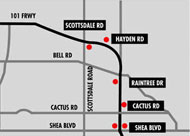Article from: www.thenewspaper.com/news/09/918.asp
1/24/2006
Arizona Freeway Speed Camera to Generate $2 Million a Week
Scottsdale, Arizona freeway speed cameras could bring in more than $2 million a week in revenue.
 Scottsdale, Arizona's freeway speed camera project began issuing its first test citations on Sunday. The system claimed 1733 potential violations in its debut that would have been worth $272,081. If such figures hold beyond next month, the system will be on track to generate at least $2 million in revenue every week.
Scottsdale, Arizona's freeway speed camera project began issuing its first test citations on Sunday. The system claimed 1733 potential violations in its debut that would have been worth $272,081. If such figures hold beyond next month, the system will be on track to generate at least $2 million in revenue every week.
The city hired Redflex Traffic Systems to operate a set of six speed cameras to monitor drivers along the Loop 101 freeway as it passes through Scottsdale. The devices use built-in pavement sensors, and not radar, to measure speed. Initially, the devices are set to ticket those driving 11 MPH above the 65 MPH speed limit. Other jurisdictions, such as nearby Mesa, routinely lower the ticketing threshold to as little as 5 MPH once political opposition has subsided. Scottsdale's test phase ends February 22 when the first real $157 citations will be mailed. Redflex will receive $42.48 for each citation the Australian camera vendor can generate.
Insurance companies, including AAA, also stand to benefit from the program as three demerit points are assessed against the license of a driver for each ticket and remain on the record for five years. These companies, in turn, can raise the motorist's annual premium by hundreds of dollars. A single high-speed trip along the 7.8-mile stretch of freeway could generate nine points -- more than a drunk-driving conviction -- and a possible six-month license suspension. That's in addition to the $471 in tickets.
If it proves successful, Arizona Governor Janet Napolitano (D) hopes to expand the freeway speed camera concept statewide. In 2004, Scottsdale deemed its side-street photo enforcement program a success after boosting ticket revenue 75 percent to $9.3 million a year, despite a near-doubling in fatal collisions.
 Scottsdale, Arizona's freeway speed camera project began issuing its first test citations on Sunday. The system claimed 1733 potential violations in its debut that would have been worth $272,081. If such figures hold beyond next month, the system will be on track to generate at least $2 million in revenue every week.
Scottsdale, Arizona's freeway speed camera project began issuing its first test citations on Sunday. The system claimed 1733 potential violations in its debut that would have been worth $272,081. If such figures hold beyond next month, the system will be on track to generate at least $2 million in revenue every week.